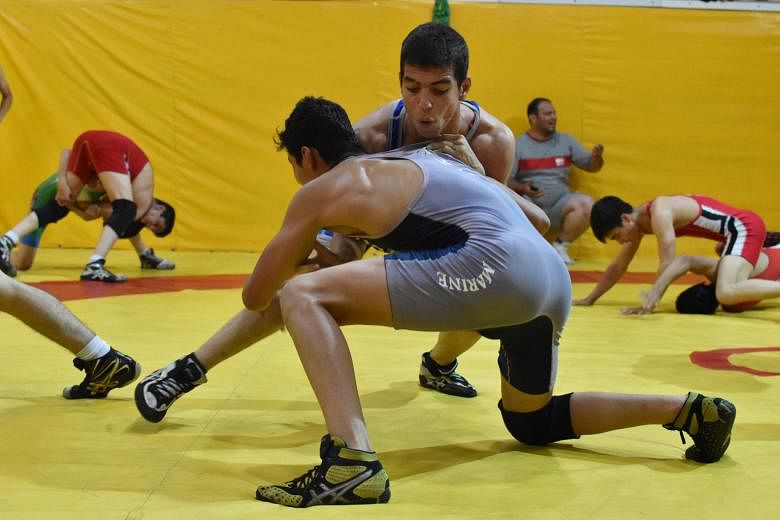In a dimly-lit alley in Teheran, a motley crew of men troop into a gym.
Here, there are no top-of-the-line fitness machines. Neither is there an air-conditioning system humming. Rather than hoisting dumbbells, the men lift and twirl thick wooden clubs.
Instead of being plugged into earphones, the men's ears listen for the drumbeat and voice of the morshed, a guide who sets the pace of the training.
Practitioners perform a series of exercises using clubs, push-up boards and shields among others, a mix of strength training and religious meditation.
Officially called Varzesh-e-Bastani, this sport and the gym is colloquially referred to by Iranians as zurkhaneh.
These zurkhanehs may lack the bells and whistles of modern athletic training centres, but they have laid the foundation for Iran to be a powerhouse in the sport of wrestling.
"Zurkhaneh is not only a sport, it belongs also to our culture and our religion," said Davood Kooshkestani, 53, manager of a gym called Zurkhaneh Ghaem.
"The origins of some sports in Iran have come from zurkhaneh. I see this sport as the main branch and wrestling is a part of it."
Widely regarded as Iran's national sport, wrestling boasts a large following in the country where crowds of over 10,000 often gather to catch major international competitions.
Iran also boasts a stellar track record in wrestling at the summer Olympics, accounting for 43 of the country's total of 69 medals in all colours.
In last year's Rio Games, Iranian wrestlers finished with one gold, one silver and three bronzes in the freestyle and Greco-Roman categories.
The sport is traditionally male-only, but the Islamic Republic of Iran Wrestling Federation has introduced belt wrestling, where exponents try to take down their opponents by grappling with their belts, and grappling categories for women interested in the sport.
There are an estimated 500 zurkhanehs in Iran, but young wrestlers prefer to visit wrestling gyms where they learn modern methods of physical conditioning and can receive specialised training.
Yet, an official from Iran's wrestling federation believes the influence of the traditional sport on contemporary wrestling remains till this day.
Describing the sport as "a shadow of modern-day wrestling", Salar Tavakoli said the Iranian Olympic squad often visits zurkhanehs in the lead-up to the Games to tap into the positives of the traditional sport.
"Training there develops their personality, spirit and mentality. Rather than going there to physically get strong, it is a place for them to learn ethical things," the 32-year-old said. "In zurkhaneh, the morshed sings about pahlavans (heroes) of old and their behaviour. Participants reflect on those songs and try to channel that spirit as they exercise."
Practitioners of zurkhaneh also say it emphasises developing virtues such as humility and honour.
"Respecting elders is very important in zurkhaneh. The oldest men stand under the morshed, they have the prominent positions. The newest individuals stand farthest away and watch their actions," said Mohammed Kazem Koohi, 47, who has practised the sport for 28 years.
"One also has to ask for permission before entering the zurkhaneh as a gesture of respect. The complete package of the sport teaches life values."
While there are no official statistics on the number of wrestlers in the country, there are approximately 2,000 coaches, added Tavakoli.
Besides aiming to retain the country's international stature, these coaches also focus on producing sportsmen of upstanding character, said Ali Akbarnejad, a former wrestler who finished fourth in the 1992 Barcelona Olympics.
"It is not important for coaches that wrestlers only win the games," said the 45-year-old. "Coaches speak to the wrestlers and show them in our manners how to behave. The coach is also a teacher, athletes look at him and learn by looking at his manner."
"In zurkhaneh, the young ones learn from listening to advice of seniors who instruct them. This is the same for wrestling," added Akbarnejad, who helped set up a zurkhaneh alongside a wrestling gym at the University of Tehran's Faculty of Physical Education and Sport Science, where he teaches.
Although wrestling is rarely offered as an extra-curricular activity in Iranian schools, children begin training from as early as seven-years-old in local gyms.
The top wrestlers then represent these gyms in competitions and the winners are invited to join the various national age-group teams.
Akbarnejad's teenage nephew Iman Derakhshan's dream is to represent Iran at the 2020 Tokyo Olympics and to follow in the footsteps of his uncle and grandfather, who was a recreational wrestler who started the sporting tradition in the family.
"It's a special sport for brave men and everyone who does wrestling can build his life and character too," said 15-year-old Iman, who was inspired to take up the sport when he was 10.
Zurkhaneh and wrestling have historically produced some of Iran's most popular sportsmen such as Gholamreza Takhti, who is beloved for his sportsmanship.
Portraits of the 87kg freestyle gold medallist at the 1956 Olympics are a common sight at wrestling gyms and zurkhanehs alike.
One of those inspired by Takhti is national wrestler Amir Monjazi, 35, who also runs his own construction business.
He said: "Zurkhaneh makes our spirit powerful. We listen to our heroes, we see them, we feel them.
"When you want to be a wrestler, it is not just your physique that needs to be strong but your spirit. If your body is strong but your spirit is weak, it is useless."
Ultimately, wrestlers such as Monjazi believe their prowess in wrestling is a by-product of the timeless legacy of zurkhaneh and this is what sets Iran apart from the rest of the world.
Said Monjazi, whose dream is to win an Olympic gold medal: "When families gather, two or three kids will automatically start to wrestle with each other. Wrestling is in our blood."

